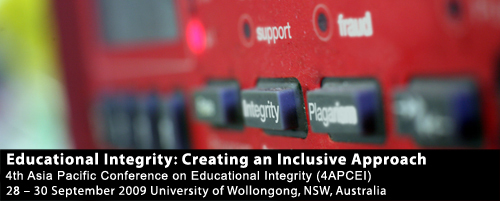Location
41.107
Start Date
30-9-2009 11:30 AM
End Date
30-9-2009 12:00 PM
Description
This paper focuses on an innovative way of teaching and learning inspired by cooperative inquiry. Cooperative inquiry is usually used as an empowering research methodology for participatory transformation and is deeply engaged with the human condition. This paper reports on its modification within a hierarchical tertiary education setting through a process named ‘Academic Co-creative Inquiry’ where teachers and students through a collaborative process co-create the context and the content for the course and mutually assess its effectiveness. The focus of this study is a Spirituality and Social Practice course within a Masters of Social Practice programme at Unitec, New Zealand. A co-creative inquiry of this kind resulted in a very high engagement of students, remarkably positive feedback about the course, very high standard of assignments and an increased collaboration between students. Peer and self-assessment, especially peer assessment from practitioners in the area of students’ practice, contributed to integration of theory, practice and experience and proved to be useful not only for students but for peer assessors as well. Students reported about personal integrity that developed during this process and emphasised the importance of the context of inclusiveness that was co-created where all voices were heard and where a range of alternative views were appreciated and explored for the purpose of learning about respecting difference. A summary of findings from this unusual and truly collaborative, student centred, inclusive and inquiry based approach is presented and critically analysed.
Academic Co-creative Inquiry: Creating Inclusive Processes for Learning
41.107
This paper focuses on an innovative way of teaching and learning inspired by cooperative inquiry. Cooperative inquiry is usually used as an empowering research methodology for participatory transformation and is deeply engaged with the human condition. This paper reports on its modification within a hierarchical tertiary education setting through a process named ‘Academic Co-creative Inquiry’ where teachers and students through a collaborative process co-create the context and the content for the course and mutually assess its effectiveness. The focus of this study is a Spirituality and Social Practice course within a Masters of Social Practice programme at Unitec, New Zealand. A co-creative inquiry of this kind resulted in a very high engagement of students, remarkably positive feedback about the course, very high standard of assignments and an increased collaboration between students. Peer and self-assessment, especially peer assessment from practitioners in the area of students’ practice, contributed to integration of theory, practice and experience and proved to be useful not only for students but for peer assessors as well. Students reported about personal integrity that developed during this process and emphasised the importance of the context of inclusiveness that was co-created where all voices were heard and where a range of alternative views were appreciated and explored for the purpose of learning about respecting difference. A summary of findings from this unusual and truly collaborative, student centred, inclusive and inquiry based approach is presented and critically analysed.


